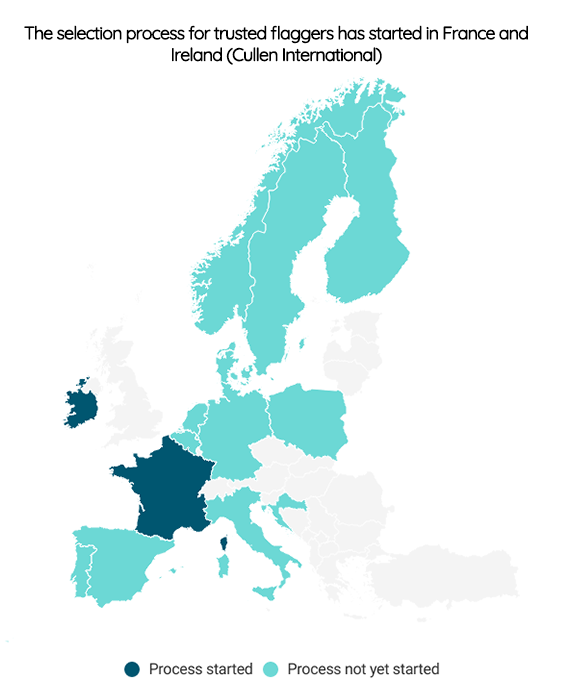Cullen International has just published a new benchmark showing in thirteen selected countries if there is information on the certification process of trusted flaggers under the DSA, for example, if Digital Services Coordinators (DSCs) have started the certification process or if a deadline is foreseen. It also shows who the certified trusted flaggers are likely to be (where information is available).
Article 22 of the DSA provides that online platforms must put in place a flagging system which gives priority to the notices they receive from entities that have been awarded the status of trusted flaggers. It also states that the status of trusted flagger must be awarded, upon application by any entity, by the DSC of the member state in which the applicant is established, to an applicant that has demonstrated that it meets some conditions (such as expertise and independence).

The benchmark shows that two out of the thirteen countries surveyed have started a selection process of trusted flaggers. Although not yet formerly appointed as DSC, the French media regulator (Arcom) has created a dedicated page on its website which contains the conditions to become a trusted flagger and how to apply.
For more information and access to the benchmark, please click on “Access the full content” - or on “Request Access”, in case you are not subscribed to our European Media service.
more news
19 December 25
CSRD transposition: Belgium, Denmark, Finland and Slovenia transpose the “stop-the-clock” directive
Cullen International’s updated benchmark tracks the progress made by the 27 EU member states in transposing the CSRD and the related “stop-the-clock” directive.
19 December 25
Global trends in AI regulation
Our latest Global Trends benchmark compares policies and regulations on artificial intelligence (AI) across 14 jurisdictions around the world.
19 December 25
Implementation of European Media Freedom Act: general overview in 12 EU member states
Our new Media benchmark shows if there are initiatives/rules in the selected countries which aim to put into application the EU Media Freedom Act (EMFA). If yes, it describes the scope of the main measures proposed. The benchmark also provides information on the next legislative or regulatory steps.